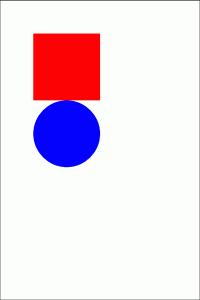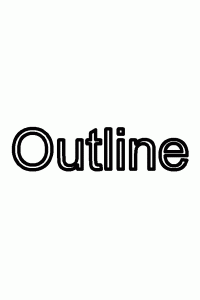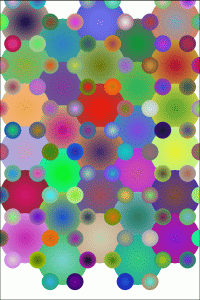nanDECK - What's new in version 1.14
![]() New FONTCHANGE directive
New FONTCHANGE directive
This directive is useful when you want to temporarily change the fonts used in a script to other fonts (and you haven't used any label); for example when you test a script on a pc without a font. The syntax is:
FONTCHANGE = "old font", "new font"
![]() New LIMIT directive
New LIMIT directive
This directive charges four variables with the last object's coordinates (PT, PB, PL, PR = top, bottom, left, right). For example, if you want to draw a circle below a square, this is the script:
RECTANGLE = 1, 3, 1, 2, 2, #FF0000
LIMIT = 1
ELLIPSE = 1, PL, PB, 2, 2, #0000FF
This is the result:

![]() New CONCAT function
New CONCAT function
This label function creates a new label concatenating different elements, the syntax is:
[label] = CONCAT(param1, num1, param2, num2...)
For example, with this line:
[label] = CONCAT(#000000, 3, #FFFFFF, 2)
The result is:
[test] = #000000#000000#000000#FFFFFF#FFFFFF
![]() Added parameters to PAGE directive to hide guidelines
Added parameters to PAGE directive to hide guidelines
If you didn't want to show the guidelines on odd pages, you can use the E parameter, for example:
PAGE = 21, 29.7, PORTRAIT, E
If you didn't want to show the guidelines on even pages, change the last parameter to O.
![]() Added parameter to TEXT directive for outlined text
Added parameter to TEXT directive for outlined text
This parameter draws a text with an outlined font, for example:
FONT = Arial, 48, , #000000
TEXT = 1, "Outline", 0, 0, 100%, 100%, center, center, 0, 100, 0.1
The last parameter is the width of the line utilized to outline the font. This is the result:

![]() Added parameter to FONT directive to disable clipping
Added parameter to FONT directive to disable clipping
Normally, a text is clipped outside its rectangle, if you want to disable the clipping, add a N parameter to the FONT directive.
![]() Added parameter to SAVE directive for creating zip
Added parameter to SAVE directive for creating zip
When you save cards' images, you can add them to a zip file, adding a parameter to the SAVE directive, for example:
SAVE = 1, "example.png", 0, 0, 100%, 100%, , "c:\test.zip"
![]() Added parameters to HTMLTEXT/HTMLFILE directives to increase definition
Added parameters to HTMLTEXT/HTMLFILE directives to increase definition
This parameter increases the resolution used for the rendering of HTML files/texts. For example, if you want a x2 rendering:
HTMLFILE = 1, "test.html", 0, 0, 100%, 100%, #FFFFFF, 0, 2
![]() Added parameter to FRAMECLOCK function for rotating frames
Added parameter to FRAMECLOCK function for rotating frames
The last parameter rotates the whole "clock" created with FRAMECLOCK, for example, this is a rotation of 90°:
[clock] = FRAMECLOCK(0, 0, 6, 9, 1, 1, 12, 90)
![]() Using Frames for Frames' definitions
Using Frames for Frames' definitions
Now you can define a frame using multiple frames as sources, for example:
[atom] = FRAMEHEX(0, 0, 100%, 100%, 0.75, N)
[elec°] = FRAMECLOCK(<atom*>, 0.5, 0.5, 6, 30)
ELLIPSE = 1, <atom*>, #HHHHHH#HHHHHH@360
ELLIPSE = 1, <elec*>, #HHHHHH#HHHHHH@360
This is the result:

![]() Label definition
with conditions and loops
Label definition
with conditions and loops
Label definitions can be done conditionally or within a loop. This is the syntax:
[label]%[condition], variable, start, stop, step = [value]
Note: the [condition] must be another label, and the text "variable" can be used both in name and value. For example:
[check1] = [a] = 1
[check2] = [a] <> 1
[color]%[check1] = #FF0000
[color]%[check2] = #0000FF
Another example:
[lab(count)]%,(count), 1, 10 = {(count)^2}
![]() Fixed bug in DUPLEX directive
Fixed bug in DUPLEX directive
![]() Fixed bug in FONT directive
Fixed bug in FONT directive
![]() Fixed bugs in visual editor
Fixed bugs in visual editor